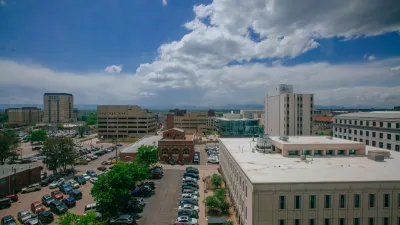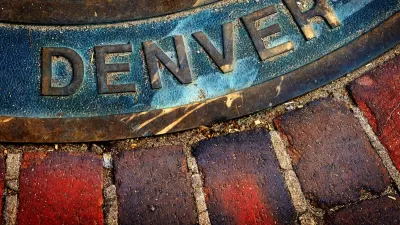The sight of trains passing by luxury condos might be foreign to some cities, but not Denver. The risk posed by crude oil shipments passing on those rails, however, is too much for some residents to accept without a plan.
Jon Murray reports on a growing concern in the Denver area about freight trains carrying crude oil shipments through urban neighborhoods of all kinds—"old and new, upscale and hardscrabble."
Some residents have made appeals, "met with mixed success," for increased emergency plans. "The issue prompted a rare budget amendment dispute in early November between Mayor Michael Hancock and a majority of the City Council, led by at-large member Debbie Ortega," according to Murray. "Hancock rejected their amendment to fund a $250,000 outside safety study. Instead, he ordered up a working group, led by Fire Chief Eric Tade, that by July 1 will examine what more the city might do to reduce risks."
There is a little of a "who was here first" dilemma at play in the controversy. The rail lines and train yards predate a lot of the neighborhoods and developments in the Central Platte Valley, but increasing crude shipments have raised the stakes of putting those transportation routes in such close proximity to residential neighborhoods. Murray explains the crude oil shipments through the city as part of a broader trend: "Nationally, crude oil volume on the rails has skyrocketed from just shy of 10,000 tank cars in 2008 to about 500,000 last year, The Associated Press recently reported."
FULL STORY: Oil trains raise alarm for Denver residents in growing neighborhoods

Alabama: Trump Terminates Settlements for Black Communities Harmed By Raw Sewage
Trump deemed the landmark civil rights agreement “illegal DEI and environmental justice policy.”

Planetizen Federal Action Tracker
A weekly monitor of how Trump’s orders and actions are impacting planners and planning in America.

The 120 Year Old Tiny Home Villages That Sheltered San Francisco’s Earthquake Refugees
More than a century ago, San Francisco mobilized to house thousands of residents displaced by the 1906 earthquake. Could their strategy offer a model for the present?

In Both Crashes and Crime, Public Transportation is Far Safer than Driving
Contrary to popular assumptions, public transportation has far lower crash and crime rates than automobile travel. For safer communities, improve and encourage transit travel.

Report: Zoning Reforms Should Complement Nashville’s Ambitious Transit Plan
Without reform, restrictive zoning codes will limit the impact of the city’s planned transit expansion and could exclude some of the residents who depend on transit the most.

Judge Orders Release of Frozen IRA, IIJA Funding
The decision is a victory for environmental groups who charged that freezing funds for critical infrastructure and disaster response programs caused “real and irreparable harm” to communities.
Urban Design for Planners 1: Software Tools
This six-course series explores essential urban design concepts using open source software and equips planners with the tools they need to participate fully in the urban design process.
Planning for Universal Design
Learn the tools for implementing Universal Design in planning regulations.
Clanton & Associates, Inc.
Jessamine County Fiscal Court
Institute for Housing and Urban Development Studies (IHS)
City of Grandview
Harvard GSD Executive Education
Toledo-Lucas County Plan Commissions
Salt Lake City
NYU Wagner Graduate School of Public Service





























